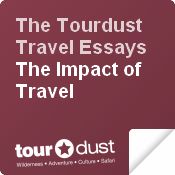Travel: the ultimate must-have possession?
In the third of a series of articles exploring why we travel, David Jobanputra asks if our travels are anything more than an act of consumption through which we can define ourselves as we wish. Sophisticated, trendy, caring; we choose a personal brand identity to which we aspire and the travel industry supplies us with the right product to match.
If you enjoyed this article, you can subscribe to the rest of the series via our RSS feed.

The Apple iPad, Reebok Classics, Sainsbury’s Taste the Difference Aegean tomato and yak cheese focaccia – ours is an age of consumerism. From our first forays to the sweet shop, through birthdays, toy ads and Christmas lists, we are subtly schooled in the art of desire; by the time we reach early adulthood, we are all grandmasters of the craft.
We know what we want, we know how to get it, we know how much it costs. We know why it’s better than its rivals, why Fad magazine gave it 8/10 neighbour’s asses, why Stephen Fry is tweeting about it.
We know what we want. And we know we don’t need it.
Consumption has been called the pre-eminent postmodern act. It’s the means through which we in the West, adrift in a world without meaning, cut loose from nature and history, traverse these troubling times. It is our lifejacket. It is also our straitjacket. For the first time in history, entire societies are engaged in acts of holistic consumption. We buy not merely what we need to survive, but also what we need (or so it may seem) to ensure a happy existence. And so we buy safety, comfort, beauty and health, learning, leisure and love. We buy status, power, a sense of inclusion. We even buy our adventures.
In the age of consumerism, everything is commoditised. To buy or not to buy, that is the question. Rainforests, footballers, hospital beds – the infectious logic of the market makes products of them all. And tourism shows no immunity.
Transnational travel makes culture a commodity. When the ethic of consumption is extended to new people and places, everything comes with a price. Visit to the palace - $12; mountain trek - $35; traditional dance performance - $8; sense of self-worth – priceless. Today’s holiday brochures boast bargains like an Argos catalogue; instead of homeware and cheap electronics, we find tigers, temples and tribal villages. All are commodities, just the same.
We buy these things for the same reason we buy any other nonessential product: to look better, feel better or else appear better. We are, in effect, cultural cannibals, consuming culture so as to assimilate some aspect of it. Thus, New York confers cosmopolitanism, India spirituality, the Caribbean coolness and so on. And then there are optional extras, side dishes if you like. A five-star hotel suggests status, a wine tour imparts taste, the prefix ‘eco-’ implies ethical acumen. In the realm of the tourist-cannibal, you are what you eat.
And thus, we travel to consume; it’s all that we know how to do. Consumption is our (shop) window on the world, framing our every experience. Just as once we defined ourselves by what we produced, now it is what we consume. Consumption, then, is mandatory, involuntary even. And travel is yet another market place. It is the new mall in a small town, with new stores, new brands and new possibilities. And so we buy flights and daytrips and waterproof clothing and rugs and postcards and carved wooden statues and tea and timeshares and tailor-made suits. We buy everything and anything. New malls are opened, new cultures consumed. Supply follows demand.
Supply follows demand, but with a marked dislocation: demand from the West; supply from the Rest. So travel is a form of imperialism, an expansionist project in which vast armies of pleasure-seekers are deployed daily to ‘colonise’ new lands, safe in the knowledge that their motives are sound (the customer is always right). It is to this issue, together with other inadvertent effects of travel, that I dedicate the following articles.
About David Jobanputra
David Jobanputra is a writer and anthropologist specialising in development, cultural change and environmental ethics. He recently completed a PhD in Social Anthropology at University College London, which looked at grassroots advocacy and eco-development in the Aravalli mountains of Rajasthan, India. In addition to living and working in the subcontinent, David has travelled extensively throughout Europe, Asia and Africa, including overland trips from Tibet to Scotland and Beijing to Java. David recently returned from 18 months living with a tribe in the Rajasthani desert.
